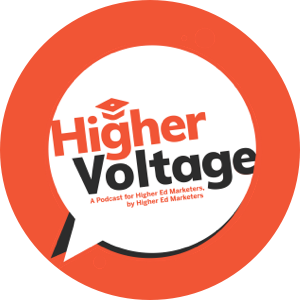Read the full transcript here:
Kevin Tyler:
Higher Voltage is presented by Squiz. University websites are filled with great information, but too often users can’t find what they’re looking for, even through the internal site search feature. Funnelback, the site search product by Squiz, changes the way people engage with content by revolutionizing search.
Kevin Tyler:
It provides key insights that can drive the creation of content that your users are actually looking for. And that’s just the start of what Squiz can do for your higher ed institution. Visit squiz.net, that’s S-Q-U-I-Z.net, to see how Funnelback by Squiz can create a smarter site search option for your institution’s website today.
Kevin Tyler:
Hello, and welcome to Higher Voltage, a podcast about higher education that explores what’s working, what’s not, and what needs to change in higher ed marketing and administration. I’m your host, Kevin Tyler.
Kevin Tyler:
Welcome back to Higher Voltage. Today we are pleased to welcome Provost Denise Runge from University of Alaska Anchorage. We came across a piece from Denise, about a month ago, talking about improving access to higher education and what college and universities can do to help improve access and to meet students where they are, and upon reading that article, knew she needed to be a guest on this show. So, happy to welcome you, Provost Runge. May I call you Denise?
Denise Runge:
Please do. And it’s good to be here.
Kevin Tyler:
Thank you. It’s great to have you here. Before we dive into the meat of our conversation, I’m wondering if you can just give us some background on when you got to University of Alaska Anchorage, we know what provosts do, but how you got into this space of talking about improving access and how we might be able to meet students where they are?
Denise Runge:
Sure. I came to the University of Alaska Anchorage about six years ago. Going on my seventh year this summer. And one of the things that drew me here is the fact that UAA talked about access and was committed to access and mentioned it in its mission. So, for me, I’ve worked in the higher ed space at both community colleges and universities, both public and private, and I’ve been following how all the different types of higher ed institutions think about access. And what was attractive about this particular institution is how it seemed committed to both missions simultaneously.
Kevin Tyler:
I think that’s an interesting point. I think in the work that I do every day we hear about the importance of access, but that isn’t often reflected in the operations and the recruitment processes and the services and supports that are offered on campus. So, how did you come to understand the intent and the deliberate nature of UAA’s approach to access and knowing it was an actual priority for the institution?
Denise Runge:
A lot of it had to do with some of the first people that I met with, even when I was still a candidate for the position that I held here previously. And these were faculty who were teaching, for example, Developmental Mathematics. And as I talked with them about what they were doing, they were passionate, they were really passionate about figuring out a way to, as they put it, more or less work themselves out of a job.
Denise Runge:
They wanted students to be able to go directly from wherever they’re coming from into credit bearing college level courses. So, when I met faculty like that and when I met staff with similar goals, I really knew that it wasn’t just a statement, that it was truly the way this place was going to be thinking and acting. So, it was very attractive to me.
Kevin Tyler:
Excellent. So, we were having this conversation because of an opinion piece that you wrote for Inside Higher Ed in, I think, mid-April of this year. And in it you lay out some of the initiatives that University of Alaska Anchorage has launched to improve access in terms of financial access and financial support through a student experience. I’m curious about the genesis of that piece, and if you could talk to just some of the high points of some of the efforts that the institution is launching to help with access.
Denise Runge:
Sure. So, like so many other institutions, the COVID relief funds, the pandemic relief funds that we received were both a blessing and a challenge. The aid that went directly to students wasn’t claimed as easily and as quickly as we thought that it might be. And likewise, while we’re not a heavily residential campus, we did have some students who were previously in our residence halls that were really severely impacted.
Denise Runge:
So, one of the first things that our cabinet did was talk through, how can we use these COVID relief funds to make sure that those among our students who are the most marginalized, who are the most likely to stumble and feel they may not be able to persist, given everything that’s going on with COVID, how can we target those students in the way that we distribute some of this relief aid?
Denise Runge:
So, we waived a lot of fees, we provided housing support for students, we got rid of a variety of those kind of financial barriers. Then, fast forward to this year, early spring, and that same group around the cabinet table is sitting and talking about, as we see COVID beginning to recede and our campus is returning to somewhat more of a normal type of operation, what are we going to do with these COVID relief strategies that we implemented, especially what are we going to do when that funding runs out? Are we going to continue these things?
Denise Runge:
And as a cabinet, we pretty quickly decided that, to the extent that we possibly can, we wanted to maintain those. We wanted to maintain that stance. One of the greatest examples that I can give of a strategy that we definitely want to continue is, we looked at students who had failed a course or earned a D in a course for the first time during the pandemic, and then the following semester, we had their college reach out to them.
Denise Runge:
So, the dean of the college wrote to the student and said, “Look, we know how hard COVID has been. We believe in you, and so we’re gonna offer you the opportunity to retake this course at no additional cost.” So, it was essentially a university scholarship to retake the course. And several hundred students took us up on it the first semester, and of those students who retook the same course, 68% of them earned a higher grade.
Denise Runge:
So, if they had earned an F, they earned at least a D or higher. If they had earned a D they earned at least a C or higher. And a surprising number of them earned a B or an A. So, it was really gratifying. And the primary response that students had was essentially, “Oh, my goodness. I didn’t know. You cared about me. You, you don’t want to take my money and have me fail this same course over and over again. You actually want me to be a successful student.” So, this is one that we, if at all possible, financially, it’s tough, but we want to continue this. We really believe in this strategy.
Kevin Tyler:
Denise, I have chills. And I don’t mean to sound exaggerated about that. I think that these kinds of initiatives and these kinds of thoughtful approaches to student success always excite me because they sometimes feel rare that someone takes the additional step to think about how we can find the people who need our support and then offer the support in a thoughtful way.
Kevin Tyler:
So, I’m curious about, if you could share just some of the background on the conversations that occurred to make this decision, how you thought about if they get a lower grade, the people who, their performance dips during this time, how did you come up with this process is the question.
Denise Runge:
It was a series of conversations that included our Associate Vice Chancellor for Enrollment Services, my Vice Provost for Student Success, me, a couple of other people, and we bounced it off of the academic deans, and they instantly seized on it. They were like, “Yes, yes. We wanna try this. We wanna see if proactively telling the student, ‘You can do this. We’ll give you another shot at it,’ will make a difference.”
Denise Runge:
We see in our data here at University of Alaska Anchorage a really strong, unfortunate correlation between earning a D or an F and withdrawing from the university, or stopping out for a time, particularly among our first generation students and our Bipart students.
Kevin Tyler:
And in the opinion piece that you authored, you mentioned all the dynamics that can exist in a student’s life that would make them stop out, like needing to go back to work to make some more money to come back to school, and I think about all the ways that a single obstacle can change the entire trajectory of a person’s life, especially when it comes to their college experience, and how removing that one obstacle can mean the difference between a certain kind of success and another kind of existence.
Kevin Tyler:
So, I think this thoughtful approach is really exciting. I’m curious about if you’ve heard from your colleagues and from other institutions about how this might look from the outside and what they’re saying to you about that.
Denise Runge:
Yeah, I have heard from a few. I’ve had some folks reach out to me who saw the article. Also, our university is part of the Western Interstate Commission on Higher Ed, the WICHE network, and so we’ve had some conversations from WICHE institutions. And those who seem most interested in these approaches, at least the ones who are reaching out to me, are from institutions that are somewhat similar. Institutions that claim to have an access mission, institutions that proactively either enroll students who might otherwise go to a community college, or work closely with community colleges to facilitate transfer. And of course, a couple of community colleges are doing very similar approaches as well.
Denise Runge:
And what I’m hearing is all the same stuff that we struggled with, “If we are proactive like this with students who are most in need of support, is there going to be a financial payoff or is it actually going to be a financial drain?” That’s of course important. And the other thing is, do we inadvertently set students up to fail by making them think that they’ll always be somebody there to offer them that second chance? And is there a third chance? Are you going to give them a third chance? So, it’s those kinds of conversations.
Kevin Tyler:
I think that’s remarkable. How has your campus changed because of these initiatives in any way?
Denise Runge:
I don’t know that we see a lot of change yet other than more communication between students and staff or faculty or administrators. I think, at least it’s beginning to get through to student networks that rather than leaving, rather than going home, there might be a solution and they just need to ask for help. But again, I don’t want to leave our structures such that students always have to be the ones to ask for help. We really want to be more proactive about figuring out who needs our help and bringing the help to them.
Denise Runge:
But what I’m seeing is a bit more… it shows up in all sorts of ways. Students requesting, “Can I substitute this course for that course? If I could, then I can finish my degree without having to wait an extra semester.” And it used to be that they would look at the catalog and think, well, that was the only option, they had to do exactly what was laid out in the catalog.
Kevin Tyler:
Yeah. One of the most striking parts of your article was at the end when you talk about the need to be more flexible in higher ed and offer options that meet students where they are. And I think we hear those things a lot in the space, but so rarely are there really great examples of how an institution can adjust itself to meet the needs of its audiences.
Kevin Tyler:
What was the lift like on making these decisions? Was there a concerted decision around, this is what we were willing to lose because we know that we will gain this? And I’m also curious around the community that may have been created on your campus because of this new support system that you’re providing.
Denise Runge:
So, I’ll answer the second part first. There is definitely a community that has arisen on our campus, and it really began before the pandemic. In our last strategic plan, which was deliberately a very short one, we had a lot of leadership transitions. We focused on student success, and that’s when the Vice Provost for Student Success position was created, and we did some institutional shifting around of some things.
Denise Runge:
And it began a tribe, a community that has since grown. And when we went through a more fulsome process and created our current strategic plan, which now runs through 2025, “we put students first” was the universally accepted idea for one of our strategic aspirations. And this was a very broad inclusive process with faculty, staff, administrators, students, alumni, and community members. And everybody said, “Yeah, we need to put students first. It’s gotta be one of our aspirations.”
Denise Runge:
So, there’s definitely been a community of like-minded people coming together to say, “Well, this worked. What if this would work,” or to say, “Well, we tried it this way, and it wasn’t what we thought. But what if we tweaked it like this?” So, it’s a really exciting thing.
Denise Runge:
Then, to the first question, so much of it, I think, is because this institution had, as it just turns out, come through some really difficult financial times. They were widely talked about in national higher ed media. Lots of folks know what was going on in Alaska. We had major budget cuts, and, for a time, our Board of Regents in our system were seriously considering taking three separately accredited institutions and merging us into one.
Denise Runge:
What that did though once the crisis had passed, is it made people more willing to experiment and to approach things as an experiment. “Look, we got through that. We can try something, and if it fails, it’ll be okay.” And that’s not really common in higher ed in my 37 years worth of experience.
Kevin Tyler:
I would agree. I have less experience, but I know that to be true as well. I think, coming off the heels of that really tumultuous turbulent time, I remember those articles around the budget cuts and all of that. I admire the work that I read about in that article. I can’t not ask this next question because so often access is equated to not high quality in higher ed, being a place that welcomes as many people as possible to get them to where they want to be. So, for some reason is not as celebrated in things like rankings. So, I’m curious if where, if at all, the rankings conversation exists in these efforts?
Denise Runge:
Rankings has not been a focus of ours. It certainly comes up. Like every other institution, particularly those that offer masters and doctoral degrees, though ours are a limited number, we have some highly ranked programs. Just this year some of our engineering programs were ranked very highly considering our open access status. And there’s a tension. We have some alumni, we have some faculty, we’ve had some administrators who wanted to push us to become a prestige institution.
Denise Runge:
But by and large, because of who we are and where we are, we are an urban, comprehensive university in the largest municipality of the State of Alaska with the largest number of people and the largest number of students served by our institution within the state, and there’s no community college system here for us to send them off to. So, I don’t think that the rankings issue really gains much traction here. It gets swallowed up by the access conversation.
Denise Runge:
And I do recognize, again, that is the reverse of most places. I mentioned briefly that I had served in a private liberal arts institution at one time as a provost. And that tension was much greater there, even though, as it turns out, that was also an access institution in an urban area. But here we recognize that first and foremost we have to serve the students that are here because nobody else is going to. Anchorage is far from any other educational providers. It’s a three and a half hour flight to Seattle.
Kevin Tyler:
My word.
Denise Runge:
Yes.
Kevin Tyler:
So, I wanted to spend a chunk of our time together talking about just the way the institution is adjusting itself to meet its audience’s needs, because as a marketer in the higher ed space, what I think is sometimes forgotten broadly is that marketing can only tell the stories that exist on a campus. We can’t tell a different story than what is actually happening.
Kevin Tyler:
So, I’m curious around, after you made all these decisions to center your energy around students and then put students first, how has your marketing evolved? Are you telling a new kind of story about the institution that reflects some of these new ways of being?
Denise Runge:
We are. We are. And I love the question. For a long time this institution marketed itself around the theme of amazing stories. And it reminded me a bit of, remember the old Army marketing campaign, “An army of one”? It seemed lonely and singular to me, but maybe I’m wrong. So, we’ve evolved away from that, and briefly we use your hometown university. And that didn’t feel quite right either. So, particularly our Enrollment Services folks convinced us that what we ought to be talking about is, what’s next? So, the tagline now is, “What’s next?”
Denise Runge:
And that really seems to be resonating both on campus and off. We’ve done so many things. We’ve changed academically, we’ve changed in our Student Services. So, it’s all about what’s next for us, and it’s all about what’s next for the student. And that, to me, feels like I’m meeting you where you are. It doesn’t matter that I may have a goal for you to earn a bachelor’s degree. If you just want to earn an associate’s degree, that’s what’s next for you. If what you’re looking for is a workforce certificate, that’s what’s next for you.
Kevin Tyler:
I think that is so important. I think this is a conversation I think we’ve had before on the show, but I’m more than happy to mention it again because I think it’s so important, about how higher ed marketing so often, especially when it talks about outcomes, it tends to be about Fortune 500 lists, big corporations, corner offices, salaries, which are all very important and can be indicators of a certain kind of success. However, there are lots of other versions of success that people can strive for.
Kevin Tyler:
Success can look like an English teacher or an Art teacher, or a forest ranger. There are all these other places people can end up. And when you diversify the definition of what success can look like in a marketing piece like a “what’s next” for you individually, I think people can see themselves in a place much easier. And they feel validated, they feel they can find a pathway to their dream when they can see themselves.
Kevin Tyler:
So, taking these steps to be intentional about that kind of thinking as opposed to 98% of, “Graduates leave here with $100,000 salary in their pocket. Well, if I don’t get that, then, does that make me a failure?” And those aren’t the kinds of conversations we want to really see, even though that they’re important to some people.
Kevin Tyler:
So, I say all of that to say that it feels right at this moment in time to give people pathways to their prosperity, that feel right for them, and that the institution can flex itself around to give them the support that they need to get to that point.
Kevin Tyler:
And to that end, I’m curious if you can share just a bit about some of the support systems that exist at University of Alaska Anchorage, because once you invite a person in, especially when an open access approach, they might need some services and supports that other institutions can’t provide. So, how are you helping them persist through their student experience?
Denise Runge:
We have a number of different student support programs, some of which are common at a lot of institutions and some of which are quite unique to UAA, which is what we call ourselves. So, we do have a full suite of federally-funded TRiO programs. We offer a couple of Upward Bound programs, which are the high school to college transition ones, we have educational talent search, we’ve got student support services. We’ve applied for several others but haven’t heard back on those yet.
Denise Runge:
But we also have homegrown programs. We have a multicultural center, we have a native student center. For all students we have what we call the learning commons, which provides coaching, tutoring, but also just a safe place to hang and be where you want to be on campus. One of the more unique programs offered through the University of Alaska Anchorage, which actually is a nationally recognized series of programs, is Alaska Native Science and Engineering Program, or ANSEP.
Denise Runge:
ANSEP has received all kinds of accolades and funding. And it really has a life cycle approach. It provides programming for elementary students, middle school students, a high school early college program, and then a very intensive college support program for any Alaska native student, or students from primarily Alaska native rural villages, who wants to pursue science or engineering. And it’s been extraordinarily successful as well.
Denise Runge:
Then, the other thing I’ll mention is that, for so many of our students, a large percentage of them are either veterans or currently serving military or dependents of military, because the military is a significant presence in the Anchorage area. So, we have strong support programs, both in the student affairs and academic affairs, that are geared towards veterans and military affiliated.
Kevin Tyler:
I’m curious about some of the results of this work, well, not in terms of only, but especially in terms of recruitment and retention, what is that starting to look like at UAA?
Denise Runge:
So, I’ll be honest, when I arrived six, almost seven years ago, it wasn’t pretty. It wasn’t pretty at all, particularly on the retention and completion side. We very much looked like community colleges and other completely open admissions institutions in terms of both our retention and completion rates. And we didn’t, at that time, focus on disaggregating them and looking at how we were serving different subgroups of our students. We do that work now.
Denise Runge:
And one of the most exciting things is that this intentional effort from 2017 until now has resulted in a six percentage point increase in completion. And until the pandemic, had resulted in a 3% increase in retention, the pandemic knocked that back down, but it’s remained flat since then. So, we’re still up by 2%, and we expect that to begin to rebound. But the best news is that as we disaggregate data, we see improving rates of retention and completion for our Alaska native students, for some of our underserved students, for our PELL-eligible students.
Denise Runge:
So, it’s not across the board, it’s not even yet. We’ve got a lot of work to do. But as you can imagine, when you start to see those gains, it’s exciting. And when you already are focused on it, it can help build momentum and bring more people on board. Increasingly, faculty are actually reaching out and saying, “Hey, what can we do to help our students? We wanna make sure that our majors are retained and persist and complete their degrees. What do you see in our data that suggests that we need to be doing something different?” And that’s an awesome conversation to be having.
Kevin Tyler:
Yeah. Yeah, totally. Can you identify any shift in the conversations at the leadership level that you’ve noticed that just feels different from the rest of the way higher ed tends to operate? In the cabinet level, from where you sit, have decision-making conversations around access and, really, the way the entire institution operates, how have they changed because of this, I don’t want to call it “new focus” because you’ve been focused on first gen and access for a while, but it feels new because it’s now becoming part of the national conversation. So, I want to be clear about that, that this is not a new thing for your institution. It just feels new right now.
Denise Runge:
You’re right, it’s not new for our institution, and yet it even feels new here too, because it really is increasing, and it’s gained traction in ways that start to change those conversations. I think one of the things that strikes me the most is, our cabinet has been expanded over the last couple of years. We now include, at the cabinet level, a Chief Diversity Officer and an Executive Director for Alaska Native Education and Outreach. And we also created a Vice Chancellor for Research position during the same time.
Denise Runge:
What strikes me is that the Vice Chancellor for Research or the Vice Chancellor for Administrative Services are just as likely to bring up issues relating to student success, equity and access, as are the Chief Diversity Officer and the Alaska Native Education and Outreach Executive Director. So-
Kevin Tyler:
That’s incredible.
Denise Runge:
It is incredible, and when we talk about whether or not we can raise tuition rates, and the Vice Chancellor’s for administrative services first question is, “Well, what would be the impact to students? What would happen to retention rates? What, what’s the data show us about price sensitivity? Are we gonna, are we gonna scare students away if we have to raise tuition?”
Kevin Tyler:
Asking bigger questions to be more student-centered, those are the kinds of conversations that I love. This is why we exist, to make sure that we can get people where they want to be and have us be a pass-through for that. I think that’s fantastic. A couple years ago I wrote a short piece, the theme of which was that everything that happens on a college campus is essentially marketing, because people are going to be talking about their experience out in the world, whether you like it or not, whether they like it or not.
Kevin Tyler:
So, when you have these kinds of efforts that get attention, this is good news for an institution like UAA. And it is marketing, because you are demonstrating and communicating that you are shifting the way that you exist in the world so that the people who need you the most can succeed there. And you make decisions intentionally and strategically, knowing that there could be a short-term loss for the institution, but in service to a long-term gain for your students, which then could mean success for your institution.
Kevin Tyler:
So, I wonder about some of the other things that are happening at UAA that don’t directly have to do with access in equity, but lift up that mantle for a more comprehensive university experience.
Denise Runge:
Yeah, that’s a great question. So, I briefly touched on this a little while ago, and that is, we’ve taken a very intentional approach to building backwards stackable credentials. This started within a few months of the pandemic. This was before I was the provost of the institution. I was serving as a dean at the time, and I co-chaired a group here that created 16 new short-term certificates, and we called them Fast Track Career Certificates.
Denise Runge:
But the unique thing about it was, because we were still in budget difficulty, all we did was create them from existing programs. They were just shorter career-focused segments of existing programs. And the idea was that if a student, especially in a pandemic, didn’t want to commit to a full degree, let’s get them a bookkeeping certificate now so that they can go back to work, and then later they can come back and finish the full blown bachelor’s in accounting. And that, by the way, has been the most popular one by far is bookkeeping.
Denise Runge:
But we created one in Infant and Toddler Development that stacks into our bachelors and associates of Early Childhood Education. And it goes on and on and on. And those efforts really opened up our entire campus. It changed the way we talk about ourself. It changed our marketing efforts. It attracted the attention of our municipal government, who then came to us with a grant and said, “We will fund students in your Fast Track Career Certificates so that more students can do this and get back to work quickly.
Denise Runge:
So, it’s those kinds of payoffs that are really exciting. When you start to think about innovation, I’ve found anyway, especially in these last six years, that things that you didn’t even anticipate, will come your way. A related thing that we’re doing is, like so many other urban institutions, we are primarily a commuter campus, but we do have some dormitories. And even pre-pandemic they weren’t full, but since the pandemic they’ve been very sparsely occupied.
Denise Runge:
So, we’ve begun being really intentional about, okay, we serve primarily Alaska and the United States, West Coast. Who would need and want a residential experience? And what would the pricing structure have to be? And what kinds of supports would have to be in place in order to attract someone to come and actually live on campus and attend the University of Alaska Anchorage?
Denise Runge:
And when we did that, we ended up with thinking about, “Well, if they’re living in the dorm, we want them to be full time.” And that wasn’t really necessarily always required. They only had to take nine credits to be eligible to live in the dorm. Now, we’ve created a scholarship opportunity and a funding mechanism that stresses, “We want you to come and live here because we want you to be full-time, because our data shows that if you’ll be full time, at least for a year, you’re much more likely to finish a bachelor’s degree within six years, even if you later become part-time.”
Denise Runge:
Then, because of that new residential community that we’re trying to build, we then started having conversations about, what’s our first year experience look like? We don’t have a whole lot within walking distance to do, though we have an amazing campus in terms of natural beauty. So, there are conversations about, how can we better take advantage of the natural beauty around here, and the student activities, and make this whole holistic experience for students?
Denise Runge:
Then, thinking backward to some of our student support areas, how can we create communities that are focused around these groups that already have a supportive home here on campus, how can we also have a supportive home for them in a residence hall? We don’t know whether this will pay off. This is a brand new effort. We’ll see.
Denise Runge:
But those are just two examples of the kinds of things that aren’t necessarily access-oriented, but I believe have grown out of these same conversations and grown out of a willingness to be somewhat experimental.
Kevin Tyler:
And I was just going to pull that thread, your appetite for experimentation at UAA and how central that is to a student experience in higher ed is experimentation, learning, making mistakes. I find that so many times institutions are fairly hesitant to make mistakes at the leadership level and at the operational level. How has that come to life at UAA?
Denise Runge:
It’s not always easy. Like any public institution, we are answerable to a board, and because we’re part of a system, we’re also answerable to a system office. I’m not saying that their expectations are different for us, but sometimes their frame is more traditional. So, it is challenging. And you have to be proactive and talk through.
Denise Runge:
So, I remember specifically with these Fast Track Certificates, by the time we shared with our Board of Regents that we were creating them, I had become the provost at UAA, and I remember getting questions, “Why would you create 16 new certificates when we have a budget deficit? What are you thinking?”
Denise Runge:
So, we carefully walked them through, “Well, see, we didn’t have to spend any new money because these are classes that we’re already teaching because they’re built into our bachelor’s degrees, and we think this will actually attract students who might not otherwise come because they’d be scared of committing to a full four-year degree.”
Denise Runge:
So, you have to be proactive and intentional to get other people to understand the risk that you’re taking, and why it’s a calculated risk, and why it makes sense for the institution, even though there’s a chance that it will fail.
Kevin Tyler:
I could not agree with you more. One of the things I say often on the show is that the things that got higher ed institutions to where they are today are not going to be the things that get them to where they need to be next. So, that idea, that appetite for experimentation, that, I don’t want to say, not having a fear of failure, but allowing failure to happen and learning from whatever that experience is to adjust and refine and make that student experience better, that’s what higher ed is about.
Kevin Tyler:
So, what new ways can we start to attract people, retain people, support folks, and get them to where they need to be. I think this is incredible. I have a couple of more questions for you before we get you back to your day, the first of which is, what has the institution, from your perspective, learned about itself as it starts to have these conversations really strategically?
Denise Runge:
As I look back over these last several years, I think one of the most important things we’ve learned about ourselves is who our students really are and who they aren’t, because we had ideas. And we weren’t all fully far off, but we were off. For instance, faculty used to tell me all the time that our students are 25 to 30 years old, and they have kids and mortgages and work 40 hours a week. So, for that reason, I encourage them to only take one or two classes a semester.
Denise Runge:
Well, when we looked at the data, our average age is in the mid-twenties, and many of our students do have these other obligations, but if they can think of themselves as a college student, primarily, for at least one year, however we can support them to do that, that’s what’s good for them, that’s what makes them successful in the long run. And we’ve got a decade worth of data to back that up.
Denise Runge:
Then, you take that back and you share that with people, and they have that aha moment, and they realize, “Oh, you mean, by telling my students to only take one class this semester I was actually hurting them?” “Possibly.” So, I’ve really noticed most of the change in the institution is around these aha moments. And the other big change that I’ve seen is a recognition that all failure is not fatal. And my hope is that we’re getting better at sharing that with our students.
Kevin Tyler:
Yeah.
Denise Runge:
All failure is not fatal. I was not a straight A student in my undergraduate, certainly not in my high school. Nobody predicted that I was going to earn a PhD, nobody would’ve predicted that I was going to become a faculty member, let alone one day be a provost. Certainly not me. And I had to drop out of college for a while.
Denise Runge:
So, failure isn’t fatal. Failure teaches us things. And I think more institutions should recognize that, because it’s part of what we should be sharing with students. It’s okay to feel concerned and anxious, it’s okay to not be happy with the grade that you earned. It doesn’t mean you’re not cut out for this.
Kevin Tyler:
Oh, Denise, speaking my language. I love that. I appreciate you sharing the personal part of your story too, because I think that’s an important consideration in people who are listening to this. People who work in academia aren’t all straight A students and they didn’t all go to the best colleges and whatever. That is not the case. So, whatever your path is, that is the path. And I appreciate you sharing that.
Kevin Tyler:
My last question, I think, depending on what you say next, is about what you would say to folks listening to this episode, who work at institutions, that are considering moving more intentionally into this access and equity work. How do you start to move the needle here, because institutions can be hard to change.
Denise Runge:
They sure can. I’d say a couple of things. First I would say that just like UAA did, you can find examples of institutions that are similar to you, and look at what they’ve done, and try to copy it. I’m very familiar with the work of institutions like Georgia State University, and have followed them for years. And-
Kevin Tyler:
That’s a great example.
Denise Runge:
Yes. And you can hear echoes of Georgia State in the things that we’re doing. Not that we’re directly copying them, but it’s there. There are professional organizations that you can partner with, and UAA has certainly partnered with one of those large corporate organizations. And there’s lots of them. I think as well, institutions need to first focus on why. They need to focus on what their values are.
Denise Runge:
And if their value is graduation, then access looks one way. If their value is increasing the size of enrollment, because that’s important for some reason, politically, access looks different then. If their value is meeting the workforce needs of a community, access looks a little different then.
Denise Runge:
So, figuring out what’s the underlying driver, that value question. Everybody cares about access. Everybody’s talking about equity right now. That’s good. But in and of itself, it’s not the only end. So, you have to pair it up with the other things that are driving your institution, and then figure out the interplay between the two.
Kevin Tyler:
Ooh. I’m fanning myself, because I cannot agree with you more. We have these conversations. I work at an agency and we go to all these campuses, and so many times marketing decisions are based on desire as opposed to values. And when values take the front seat, it’s much easier to make really great decisions because your roadmap is, you’ve got your north star and that is your values, as opposed to, our neighbors to the east of us, they’ve increased enrollment. We have to beat them in whatever number. So, we need marketing that will help us do that. That is the wrong approach.
Kevin Tyler:
That can’t be the only reason why you do a marketing campaign or a new branding, whatever else. Values drives a conversation, and also, values can drive differentiation, which is so hard to achieve in higher ed because everyone’s offering basically the same thing. So, the point there that you raise is so critically important, at least in the work that I do, but it’s also very important in the industry, to lead with your values and make decisions based on that. That’s powerful.
Denise Runge:
Especially if everybody agrees on the values, right?
Kevin Tyler:
Yes.
Denise Runge:
If not, then that’s where you start. If you’re not really sure which value is driving, then that’s where you start.
Kevin Tyler:
Excellent. Excellent. Denise Runge, thank you so much for joining us today on Higher Voltage. Is there anything else you want to share with us that we may not have chatted about that you want folks to know about either you or UAA?
Denise Runge:
Gosh, Kevin. I think there is one. I think when we think about access and we think about student success, we often focus on first and second and maybe even third year students, but at UAA we also consider student success to be an important part of our graduate work. And our dean of the graduate school is in the middle of all these conversations. And we’ve recently applied for funding for a McNair grant. We don’t know if we’ll get it.
Denise Runge:
But I would encourage, because a lot of institutions, their graduate programs are very important to them. So, it’s important to us to think about access and equity at the graduate level too, not just the undergraduate level.
Kevin Tyler:
Oh, my. You have a couple more minutes?
Denise Runge:
Yeah. Of course.
Kevin Tyler:
What are some of the conversations that are happening in the grad space around access? Just some high level themes or initiatives that they’re thinking about?
Denise Runge:
A couple of things. One is, we have a large number of students who started a graduate program at some time and dropped out a long time ago. And like so many institutions, we have these policies that if it’s been more than X number of years, your graduate work is dead. You can’t ever use it again. We’re rethinking that. We’re having that conversation with programs.
Denise Runge:
And it’s not yet a campus-wide policy change, but individual programs are beginning to ask for exceptions and saying, “Hey, can we go back and give students 10 years, 11 years, 12 years.” So, that’s one. And another is, we’re definitely having conversations about grade minimums, GPA minimums, overall GPA versus maybe we just look at the in-major courses. Maybe we just look at the last 40 or 45 credits.
Denise Runge:
What we need is an indicator that a student can be successful. We don’t want to put somebody into graduate school who’s going to fail, of course. We are committed to quality, just like everybody else. But we know that the way that we have historically admitted students to graduate programs doesn’t necessarily admit every student who could be highly successful if allowed the opportunity.
Denise Runge:
And thirdly, at the graduate level, we’re also thinking about shorter term graduate certificates, because for a lot of students, they’re like, “Oh, no, I’m not cut out for graduate school at all. That’s not something I could do.” “Well, why don’t you try this certificate? Maybe you could do this accelerated master’s program where you use some courses in your senior year that will count towards that master’s degree.”
Denise Runge:
So, it’s been a really interesting shift to see even graduate programs and graduate faculty beginning to think about student success.
Kevin Tyler:
I’m just so excited about all this. I get very amped around conversations like this one that put students first, and that demonstrate an institution’s willingness. And at this point it feels like fluency in having conversations around equity and access, understanding the nuances, and being willing to make the mistakes that are necessary to be better and be servants for the state. And I’m just really excited about the work that UAA is doing. I’m glad that folks are benefiting from it, and I can’t wait to see what happens or what you all do next. This is really exciting work.
Denise Runge:
Well, thanks. We’re pretty excited too. We’ve got a long way to go, but it’s good work.
Kevin Tyler:
It is. Denise Runge, thank you for joining us. We will have a link to your article from Inside Higher Ed on our episode page. Please be sure to check that out. Also, please check out the links that are included in that article, links that include CUNY ASAP program that they are going to pilot, a version of, at UAA, some survey information around unenrolled students, and a lot of other really helpful resources that can help you decide and plan or plot your road to a more accessible institution. Thanks for joining us. I really appreciate it.
Denise Runge:
Thank you. It was a pleasure.
Kevin Tyler:
That’s it for this week’s episode of Higher Voltage. We’ll be back soon with a new episode. And until then you can find us on Twitter @Volthighered, and you can find me, Kevin Tyler, on Twitter @KevinCTyler2.








